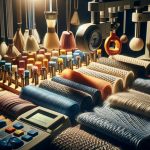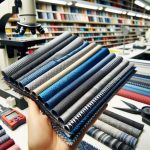When you're exploring the outdoors, you want gear that stands up to the elements, and hemp fabric might just be the solution. Known for its strength and resilience, hemp is put through rigorous durability tests to ensure it can handle everything from abrasive rocks to sudden downpours. But how does it really compare to traditional materials in extreme conditions? Understanding the testing methods and performance outcomes could change the way you think about your outdoor gear choices.
Table of Contents
Key Takeaways
- Hemp fabric undergoes rigorous durability testing, including abrasion resistance and tensile strength tests, to ensure it can withstand rugged outdoor conditions.
- Its natural resistance to mildew and UV rays enhances the longevity of outdoor gear, making it suitable for various environmental challenges.
- The lightweight properties of hemp fabric contribute to mobility, allowing users to carry more gear without added weight during outdoor activities.
- Breathability in hemp fabric keeps users cool and dry, ensuring comfort during physical exertion in diverse weather conditions.
What Is Hemp Fabric?
What makes hemp fabric so unique is its durability and eco-friendly qualities, which set it apart from traditional textiles. Hemp comes from the stalk of the hemp plant, a fast-growing crop that requires minimal water and no pesticides. This makes it a sustainable choice for those who care about the environment. When you choose hemp fabric, you're not just opting for a strong material; you're also supporting eco-conscious practices.
Hemp fibers are incredibly resilient. They're known for their resistance to wear and tear, making them ideal for various applications, including clothing, bags, and, of course, outdoor gear. You'll appreciate how hemp fabric softens with each wash while retaining its strength, ensuring longevity in your products.
Additionally, hemp has natural antibacterial properties, which means it can help reduce odors—a great benefit for outdoor adventures. It also offers UV protection, keeping you safe from harmful rays during your time in the sun.
Advantages of Hemp for Outdoor Gear
Hemp offers a range of advantages for outdoor gear, including exceptional durability, lightweight properties, and natural resistance to mildew and UV rays. When you choose hemp fabric, you're investing in gear that stands the test of time. Its robust fibers make it ideal for rugged activities, ensuring your gear withstands wear and tear while remaining reliable in challenging conditions.
Additionally, hemp is surprisingly lightweight, which means you can carry more without feeling weighed down. This is particularly beneficial for hikers, campers, and outdoor enthusiasts who want to maximize mobility and comfort.
One of the standout features of hemp is its inherent resistance to mildew and UV rays. This means your gear won't just last longer; it'll also maintain its integrity against the elements. Whether it's a rainy day or intense sun exposure, hemp fabric won't degrade as quickly as other materials might.
Moreover, choosing hemp is an eco-friendly option. It's sustainably sourced and requires less water and pesticides compared to conventional fabrics. So, when you opt for hemp outdoor gear, you're not only benefiting yourself but also making a positive impact on the environment.
Durability Testing Methods
To ensure the longevity and performance of hemp outdoor gear, manufacturers employ various durability testing methods that simulate real-world conditions. These tests help them assess how well the fabric will hold up against wear and tear, moisture, and UV exposure.
Here are three common testing methods used in the industry:
- Abrasion Resistance Test: This test measures how well the fabric can withstand friction from surfaces and objects. It helps identify the fabric's lifespan during activities like hiking or camping.
- Tensile Strength Test: By applying force to the fabric until it breaks, this test determines how much stress the material can handle. It's essential for ensuring that your gear remains intact in demanding situations.
- Water Resistance Test: This involves subjecting the fabric to water exposure to evaluate its ability to repel moisture. It's crucial for outdoor gear that needs to keep you dry in unpredictable weather.
These methods provide valuable insights into the performance capabilities of hemp fabric, ensuring that your outdoor gear remains tough and reliable in the field.
Performance in Various Conditions
When you're out in the elements, knowing how hemp fabric holds up against various weather conditions is crucial.
It boasts impressive weather resistance features that keep you dry and comfortable.
Plus, its abrasion resistance ensures that your gear can withstand the rigors of outdoor adventures.
Weather Resistance Features
Weather resistance in hemp fabric ensures that your outdoor gear remains durable and functional, even in challenging conditions. This natural fiber boasts several features that protect you from the elements, making it a solid choice for outdoor enthusiasts.
Here are three key weather resistance features of hemp fabric:
- Water Repellency: Hemp fibers have inherent water-resistant properties, allowing them to repel moisture and keep you dry in light rain or damp conditions. This helps maintain comfort during unpredictable weather.
- UV Protection: Hemp fabric effectively blocks harmful UV rays, reducing your risk of sunburn during long outdoor excursions. You'll appreciate how it shields your skin while you're enjoying the great outdoors.
- Breathability: Despite its durability, hemp is breathable, allowing air circulation that keeps you cool and comfortable. This is particularly beneficial during physical activities, ensuring you don't overheat.
Abrasion Resistance Testing
Abrasion resistance testing reveals how well hemp fabric holds up against wear and tear in various outdoor conditions, making it a reliable choice for gear that faces rugged environments. When you're trekking through rocky trails or navigating dense brush, the last thing you want is your gear falling apart. Hemp fabric has shown impressive durability in these scenarios, consistently outperforming many synthetic alternatives.
In testing, hemp's natural fibers exhibit a strong resistance to fraying and tearing, even in harsh climates. Whether it's wet, dry, or fluctuating temperatures, hemp maintains its integrity, ensuring your gear lasts longer. This performance is crucial when you're relying on your clothing or equipment in challenging situations.
Moreover, hemp's breathability doesn't compromise its strength. It allows moisture to escape, reducing the risk of mildew or odor, which can be a concern in damp environments. If you're serious about outdoor adventures, investing in hemp fabric gear means you're choosing functionality without sacrificing comfort.
Environmental Impact of Hemp
When you consider hemp's environmental impact, you'll find it stands out for its sustainable farming practices that use fewer resources.
Plus, its biodegradability means it won't linger in landfills like synthetic materials.
Ultimately, choosing hemp can help reduce your carbon footprint, making it a smart choice for eco-conscious outdoor enthusiasts.
Sustainable Farming Practices
Sustainable farming practices for hemp not only enhance soil health but also reduce the need for harmful pesticides and fertilizers.
By incorporating these methods, you're contributing to a healthier ecosystem while growing a versatile crop. Here are three key sustainable practices you should consider:
- Crop Rotation: Alternating hemp with other crops improves soil fertility and disrupts pest cycles, making your farming more resilient.
- Cover Cropping: Planting cover crops during off-seasons prevents soil erosion, enhances biodiversity, and promotes nutrient retention. This keeps your soil rich and productive.
- Minimal Tillage: Reducing tillage helps maintain soil structure and organic matter, which increases water retention and decreases erosion.
Biodegradability of Hemp
Hemp's natural fibers break down easily in the environment, making it a fantastic choice for eco-friendly outdoor gear. When you choose hemp, you're opting for a material that won't linger in landfills for years like synthetic fabrics. Instead, it returns to the earth, minimizing your environmental footprint.
Unlike conventional materials, hemp decomposes naturally, enriching the soil as it breaks down. This biodegradability means that when your outdoor gear reaches the end of its life cycle, it won't contribute to pollution. Instead, it'll integrate back into the ecosystem, supporting plant growth and soil health.
Moreover, because hemp requires fewer pesticides and fertilizers during cultivation, it helps maintain biodiversity and reduces chemical runoff. By making the switch to hemp, you're not just choosing a sustainable fabric; you're also promoting healthier ecosystems.
In addition to its durability and strength, hemp's biodegradability makes it a responsible choice for outdoor enthusiasts who care about the planet.
Carbon Footprint Reduction
By choosing hemp fabric for your outdoor gear, you significantly reduce your carbon footprint, as its cultivation requires less energy and produces fewer greenhouse gases compared to conventional textiles. Hemp grows quickly, needing minimal water and no harmful pesticides, which helps protect the environment.
Here are three key benefits of hemp that contribute to carbon footprint reduction:
- Low Resource Demand: Hemp requires less water and nutrients, allowing it to thrive in various soil types without depleting them.
- Carbon Sequestration: Hemp plants absorb large amounts of CO2 during their growth, effectively capturing carbon from the atmosphere and helping mitigate climate change.
- Sustainable Practices: Hemp farming encourages crop rotation and biodiversity, promoting healthier ecosystems and reducing reliance on synthetic fertilizers.
Choosing Hemp Gear for Adventures
Choosing the right hemp gear can elevate your outdoor adventures with its durability and comfort. Hemp fabric stands out for its ability to withstand the elements while providing a soft feel against your skin. When you're venturing into the wild, consider these key factors to ensure you choose the best gear.
| Feature | Hemp Gear Benefits |
|---|---|
| Durability | Resistant to wear and tear, perfect for rugged use. |
| Breathability | Allows moisture to escape, keeping you cool and dry. |
| Eco-Friendly | Sustainable material, minimizing your environmental impact. |
When you're selecting hemp gear, look for items like jackets, pants, and backpacks that incorporate these benefits. Prioritize versatility; gear that performs well in various conditions can save you money and space. Always check for certifications that guarantee the quality of the hemp used. With the right hemp gear, you're not just prepared for your adventure; you're also making a responsible choice for the planet. So gear up, hit the trails, and enjoy the great outdoors with confidence!
Frequently Asked Questions
Is Hemp Fabric Waterproof for Outdoor Gear Applications?
Hemp fabric isn't inherently waterproof, but it can resist water to some extent. If you need waterproof outdoor gear, consider treating the fabric with a water-repellent finish or using it in combination with waterproof materials.
How Does Hemp Compare to Cotton in Outdoor Gear?
When comparing hemp to cotton for outdoor gear, you'll find hemp's stronger, more durable, and naturally resistant to mold and UV rays. Cotton, while soft, doesn't match hemp's longevity or environmental benefits in rugged conditions.
Can Hemp Fabric Be Dyed Without Losing Durability?
Yes, you can dye hemp fabric without losing durability. The dyeing process often maintains the fabric's strength, ensuring it remains resilient. Just make sure to choose dyes specifically designed for natural fibers for the best results.
What Is the Lifespan of Hemp Outdoor Gear?
Hemp outdoor gear typically lasts five to ten years, depending on usage and care. You'll find its natural resistance to mold and UV rays helps maintain durability, making it a reliable choice for outdoor enthusiasts.
Are There Any Allergens Associated With Hemp Fabric?
Yes, some people might experience allergies to hemp fabric, though it's relatively rare. If you're sensitive to certain plants, it's best to test a small area first to see how your skin reacts.
- What Is Chino Fabric Made Of? Material Breakdown - June 20, 2025
- What Is China Silk Fabric? A Comprehensive Guide - June 20, 2025
- What Fabric Is Used for Chinos? A Detailed Guide - June 20, 2025







